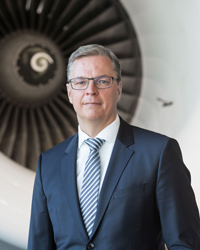Industrial
Route to the Top 2020: Interview with Johannes Bussmann, CEO Lufthansa Technik
Route to the top 2020
To gain more insights on today’s CEO, see the full Route to the Top 2020 report.
Johannes Bussmann

Johannes Bussmann has been a member of the executive board of Lufthansa Technik since September 2012, and CEO since April 2015. Bussmann began his career in 1998 as a product engineer at ABB Mannheim. In 1999, he moved to Lufthansa Technik in Hamburg to work as a development engineer in the product management and development department. In 2001, he became sales manager for Asia and Australia, working from the company's headquarters in Hamburg and then, beginning in 2003, from Singapore. He was appointed vice president of marketing and sales in 2005 and senior vice president of component services in 2007 before becoming senior vice president engine services in 2011. Bussmann has a diploma degree in aerospace engineering and a doctorate in engineering with a focus on combustion engineering, both from the University of Aachen.
Heidrick & Struggles: How do you think the role of the CEO will evolve over the next three to five years, and how will the COVID-19 pandemic shape the CEO role?
Johannes Bussmann: The role and image of the CEO will be largely shaped through their digital communication skills, and CEOs will have to be proficient in a variety of virtual and face-to-face types of interactions. Their constant presence in their employees’ lives creates a level of personal closeness with the CEO not seen before. More people will attend internal conferences and events because technology makes it easier for everyone to participate and it reduces the costs associated with physical meetings.
There will be reduced travel, and therefore all processes of production will have to adapt. At Lufthansa Technik, many maintenance tasks are already done via 4K cameras with remote guidance from skilled engineers instructing local workers and enabling them to conduct complicated interventions with the respective remote guidance. This is a totally new way of working.
Heidrick & Struggles: How have you led digital transformation? Have there been any unexpected barriers?
Johannes Bussmann: There have been no bigger barriers. Most of the leading companies have rather heterogeneous IT landscapes, which makes it more difficult to change or adapt. Greenfield companies have an advantage in this respect, as you can shape the process better from the beginning.
Heidrick & Struggles: How can boards help CEOs?
Johannes Bussmann: As CEO, I would wish for a closer collaboration with the board and would like to see a wider diversity across age, experience, and background in the advisory board. In times like these, the advisory board is much more involved in business decisions and strategy, and we need to make the most of their collective experience in both managing the crisis and setting a direction for the future. The two-tier system in Germany is coming under pressure because their role is purely advisory rather than actual oversight, and boards are not close enough to their businesses to get involved in managing our actual problems. The two-tier system very likely needs a reform that would involve looking into what the purpose of the board is, what its remit and responsibilities should be, and even what their composition should look like.
Heidrick & Struggles: How important is purpose, diversity, and sustainability on the CEO agenda?
Johannes Bussmann: For us, sustainability is one of the biggest trends. It has a clear impact on technology, and investors did a very thorough review of our plans and metrics from that perspective. The key question is whether the electric engine is actually the most sustainable solution, as some doubts are emerging as some of its applications are being rolled out and monitored.
Gender diversity in a technology firm like ours is still a bit challenging, as the pool of female engineers is still rather small. The whole sector has to make heavily technical professions more attractive to women. It will probably take one or two management generations until we have more diversity from that perspective.
Our business is very international, with people from different countries, and English has been our primary language for a long time.